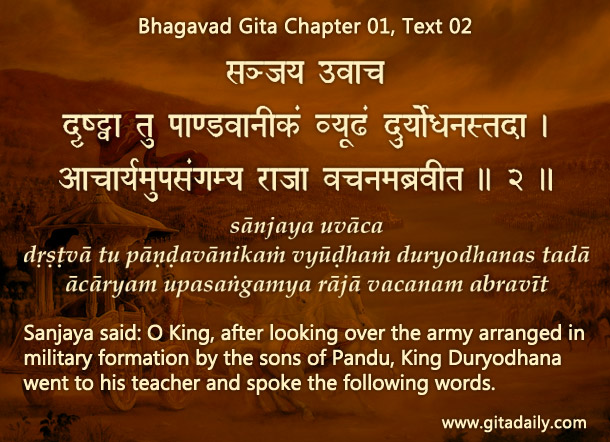The Gita’s first chapter describes how both the ungodly Duryodhana and the godly Arjuna were disturbed by observing the battlefield. And their varying responses to the disturbance reflect their differing dispositions and reveal their differing destinations.
Before the Kurukshetra war began, Duryodhana arrogantly presumed that his forces would win easily due to their numerical superiority. But when he observed the Kurukshetra battlefield and saw the Pandavas’ impressive military formations, he recognized that he had underestimated his opponents (01.02). Feeling shaken, he immediately resorted to his default behavior: political maneuvering to incite his forces to fight wholeheartedly. Due to his materialistic, anti-devotional consciousness, he completely overlooked the supreme, Krishna: though he listed prominent warriors on both sides, he didn’t even mention Krishna. That oversight proved fatal – despite being a noncombatant, Krishna played a pivotal role in Duryodhana’s defeat.
Arjuna too was disturbed on seeing the armies assembled at Kurukshetra, albeit for a different reason. Whereas Duryodhana feared his own defeat, Arjuna feared the massive human toll of the war, including his dynasty and especially his venerable elders. Feeling shaken, he initially argued against fighting in the war, but soon he reverted to his deep devotional disposition. He took shelter of Krishna, enquiring about dharma, the right thing to do (02.07). And Krishna illumined Arjuna with Gita wisdom, which provided him composure, clarity and confidence to do his difficult duty (18.73). Later in the war, Arjuna too used various strategies, but he kept his priorities straight: first thought of Krishna and then thought of fighting, as recommended in the Gita (08.07). And by Krishna’s guidance, he emerged spectacularly successful.
One-sentence summary:
Amid problems, the ungodly forget God and seek solutions solely through their mundane skills; the godly turn to God for guidance and then seek solutions by using their God-given gifts in a devotional mood.
Think it over:
- On seeing the armies at Kurukshetra, how was Duryodhana’s disturbance different from Arjuna’s?
- How do their different responses reflect their disposition and reveal their destinations?
- Amid problems, how can you respond in a more godly way?
***
01.02: Sanjaya said: O King, after looking over the army arranged in military formation by the sons of Pandu, King Duryodhana went to his teacher and spoke the following words.
To know more about this verse, please click on the image


Leave A Comment